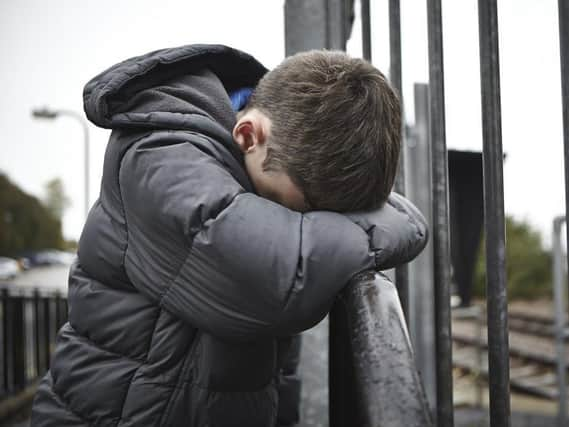Loneliness and children's mental health during Covid-19 pandemic


The NSPCC said schools are starting to ask the charity for help now children have returned after a lengthy period of isolation where some may have experienced loneliness, neglect or friendship breakdowns.
And Barnardo's calling on the Government to 'rebalance the education system' to ensure child welfare is on a par with academic achievement as the Covid-19 pandemic continues.
Advertisement
Hide AdAdvertisement
Hide AdThe Yorkshire Evening Post spoke to the two children's charities as we focus on children and young people on the third day of a special report into loneliness.
Helen Westerman, head of campaigns for the NSPCC, said: "With the schools going back we have started to see schools contacting the NSPCC for help with children who are displaying signs of mental health problems.
"During lockdown it could be that they have experienced loneliness. It may be that they have experienced loneliness and neglect or friendship breakdowns.
"More usually, children would have been in touch with their friends and they would have been in touch with people to help and support them, but that was taken away so naturally you will have some children who are affected by that.
Advertisement
Hide AdAdvertisement
Hide Ad"Some children are experiencing loneliness and we have also had calls from children who have been really scared about going back to school.
"For some children, they have read so much about the pandemic and it has affected them and their families.
"Everyone that works in child health believes that we are going to see more children and more families in need of help and support in the coming weeks and months."
During lockdown, the NSPCC urged tech giants to prioritise children as the situation created a ‘perfect storm’ for groomers to target lonely, socially isolated children as they increasingly spend time online.
Advertisement
Hide AdAdvertisement
Hide AdChildren who are lonely, like attention and rely on social media are more than twice as likely to be groomed online, the NSPCC said.
Abusers will often target children who have expressed vulnerability online, mainly through sharing thoughts and feelings in social media posts and livestreams.
Meanwhile, Barnardo's is calling on the Government to 'rebalance the education system' to ensure child welfare is on a par with academic achievement as the Covid-19 pandemic continues.
The children's charity said the pandemic, as well as side effects of the measures to contain it, have exposed the country’s children and young people to an unprecedented level of trauma, loss and adversity.
Advertisement
Hide AdAdvertisement
Hide AdThe charity said some children and young people will have experienced domestic abuse, poverty or child abuse for the first time.
Steve Oversby, director of Barnardo’s North Region, said:“Barnardo’s wants the Government to listen to the voices of children and young people, and recognise the disproportionate impact of the Covid-19 pandemic on the most vulnerable.
"We would like to see mental health and wellbeing approaches that concentrate on prevention and early intervention.
"We would also like to see a rebalancing of the educational system, so that schools have flexibility with the curriculum and that child welfare and wellbeing are prioritised and are on a par with academic achievement.
Advertisement
Hide AdAdvertisement
Hide Ad“We are offering additional support through the Barnardo’s See, Hear, Respond (SHR) programme, funded by the Department for Education, and delivered in partnership with more than 70 national and local charities.
"It is aimed at children and young people in England who may have become vulnerable because of coronavirus. Any teacher, child, young person, parent or carer can call the support line on 08001 577015 to request help.”
At the end of June, Barnardo's revealed the results of a survey of 4,000 children and young people aged eight to 24 in Britain.
They were asked how they were feeling during lockdown in an online YouGov poll for the charity between May 15 and June 2.
Advertisement
Hide AdAdvertisement
Hide AdMore than a third of the children and young people surveyed said they had experienced increased mental health difficulties during the coronavirus lockdown.
The YEP revealed in June that more than half of the weekly 4,000 calls from children and young people to Leeds-based charity Childline during the Covid-19 pandemic were related to mental health concerns.
More than a third said they have experienced an increase of mental health and wellbeing issues including loneliness, worry, sadness, and stress.
Childline fears children are the hidden victims of the Covid-19 pandemic amid concerns the lockdown will have a lasting impact on youngsters’ mental health.
Advertisement
Hide AdAdvertisement
Hide AdA Department for Education Spokesperson said: “The safety and wellbeing of vulnerable children has always been our priority which is why throughout the pandemic schools, nurseries and colleges remained open to them.
"We are placing social workers in schools to help spot the signs of abuse and neglect more quickly and work with teachers to support children at risk.
"We have also invested to increase capacity at the NSPCC helpline, and our See, Hear, Respond charities’ partnership led by Barnado’s, is directly supporting thousands of vulnerable young people.
“We are investing in a new £8m training programme to help teachers to support pupils with the impact of coronavirus on their mental health and wellbeing, including those who may have experienced bereavement, stress, trauma or anxiety over the past months.”
Comment Guidelines
National World encourages reader discussion on our stories. User feedback, insights and back-and-forth exchanges add a rich layer of context to reporting. Please review our Community Guidelines before commenting.